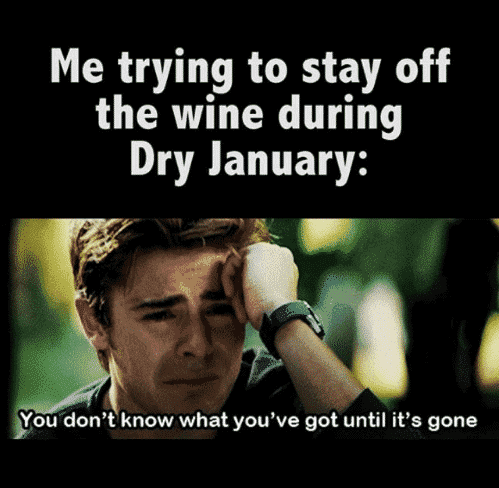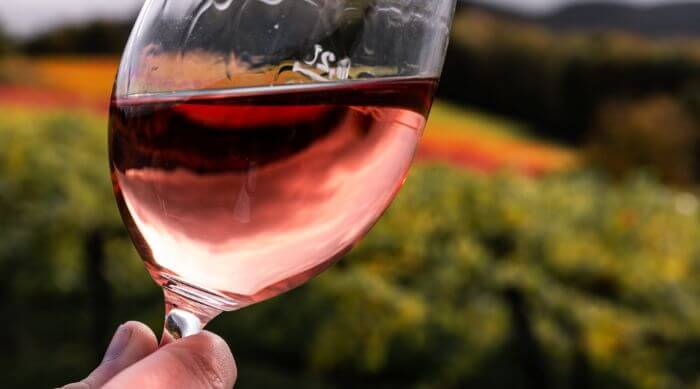In 2022, an estimated 35% of American consumers participated in the Dry January challenge. If you’re abstaining for a New Year’s resolution, weight loss, or taking control of drinking habits, Dry January is a great way to start your year!
Here’s why going temporarily alcohol-free is so good for you. Plus, we share tips for successfully completing the first month of 2023 without drinking alcohol.
If booze is your go-to party plan, ditching it for any month of the year might not be easy (at first).
What is Dry January?
Dry January is a social movement in which people abstain from alcoholic beverages for the entire month of January.
How does Dry January work? Dry January works by not drinking any alcohol during the month of January. Some choose to simply reduce their alcohol consumption, opting for a “Dry-ish January” — which is perfectly acceptable. There are no dry month gatekeepers.
John Ore of Business Insider has written about his version of “Drynuary” that started for his family in 2006. But this family tradition didn’t necessarily spark the worldwide movement we know today.
Developed by Alcohol Change UK in 2013, the official Dry January public health campaign started with 4,000 participants in the United Kingdom during its first year.
In 2020, they had over 100,000 signups and an estimated 4 million participants around the world. According to the results of a MorningConsult survey in January 2021, as many as 25 million adults (13% of adults over 21) in the US reported participating in Dry January.
In 2022, a whopping 15% of all adults in the UK put down the booze in January.
What is the purpose of Dry January? The purpose of Dry January is usually to improve health and avoid alcohol dependency problems by giving up the booze for a month. It isn’t designed for people with alcoholism, but it’s an effective way to cut back on alcohol consumption before it may become a bigger problem.
This sober month tends to attract more heavy drinkers than the general population — and offers those people unique benefits compared to the occasional wine drinker.
Is it healthy to do Dry January? Yes, it is healthy to do Dry January, for moderate and heavy drinkers alike. However, if you or a loved one experiences a condition such as alcohol use disorder, only abstaining for a month will be less impactful than solutions like psychiatry and support groups.
Want to participate in the official Dry January challenge? Here’s where to sign up for the challenge through Alcohol Change UK and receive regular support throughout the month.
6 Tips for a Successful Dry January
1. Eliminate temptations.
Before starting your alcohol-free month, it’s vital to avoid temptations to drink alcohol.
This means:
- Throwing away (or finding a trusty friend to temporarily hang onto) any alcohol currently in your home
- Avoiding gatherings or occasions where everyone around you will be drinking
- Sitting at the table, not the bar, at your favorite restaurant
- Temporarily muting or unfollowing people and brands on social media that regularly post about alcohol and drinking
Especially if you’re working on cutting down on your binge drinking, getting rid of the temptation right in front of you is one of the most essential parts of a successful Dry January.
If you're feeling adventurous, you may want to take the time this January to visit one of the awesome sober bars around the world.
2. Step up your mocktails game.
Pro tip: Abstaining from alcohol does not mean giving up fun drinks.
There are countless recipes for delicious mocktails (like these) to imitate your favorite cocktail — or to try something totally brand new!
Plus, you’ve pretty much got your pick of alcohol-free wines, plus non-alcoholic beer and spirits to use in your mocktails. We’re rather partial to the world’s first non-alcoholic rosé or our revolutionary non-alcoholic drinks in cans. 😉
(That way, you don’t have to be like sad Zac Efron.)
3. Tell your friends and family about your Dry January.
Your community matters when you’re taking on a new challenge.
Be clear and upfront with your loved ones that you’re taking time to detox from alcohol for a month. Ask for encouragement and moral support, especially if you don’t want to give up.
Above all, be direct and firm when you ask your friends and family not to offer or provide you with alcohol during the challenge.
4. Reset your routine.
Is a nighttime glass of wine part of your wind-down every evening? Do you have a standing date at a bar with your closest friends? Do you enjoy a few glasses of scotch after work each day?
Consider changing your routine to add a new workout regimen or a journaling habit. Start an intimate board game night or a crafting habit. You can even be a late adopter of the sourdough trend!
Talk to your friends about going for a walk at a local park or spending time at an alcohol-free coffee shop during happy hour. (Of course, take ever-changing pandemic situations into account.)
5. Track your progress.
Grab a journal (or even the Notes app on your phone) to keep track of how you do during your Dry January. This can be really helpful, especially if it’s your first time giving up the drinking habit.
There are a few significant benefits of keeping track of your progress:
- If you slip up, writing your oversight down may stop it from happening again. Even your personal journal is a form of accountability.
- Tracking how you feel throughout the challenge can highlight areas where you may struggle with alcohol abuse. Most people decide to take on the challenge because they want to reduce their alcohol intake, and in some cases, it might reveal a more serious issue.
- When you’re having a hard time, your record of a good day can be what you need to keep going. Reading how accomplished you felt when you hit the 72-hour mark, or how awesome it felt to wake up hangover-free last Monday, is good motivation!
6. Use an app.
Alcohol Change UK developed the Try Dry app to help people track their progress. Try Dry is totally free and offers lots of metrics. It’s one of the few free Dry January apps available at both Apple and Google Play.
Apps like Sunnyside can help if you’re not up for a dry month, but want to start being more mindful about how much you drink.
7 Dry January Health Benefits
What are the possible benefits of doing Dry January? Taking a Dry January can yield loads of health benefits. We’ll discuss these in-depth:
- Less alcohol consumption year-round
- Improved mental heatlh
- Better sleep
- Weight loss
- Stronger immune system
- Overall health
- Glowing skin
Benefit #1: Less Alcohol Consumption
Okay, stick with us here — Dry January obviously means halting your alcohol intake for a month. A study at the University of Sussex discovered that Dry January participants also drink less after the challenge is officially “over.”
Considering more than 1 in 4 adults participates in “heavy” or binge drinking every month, that’s pretty encouraging. The National Institute on Alcohol Abuse and Alcoholism also estimates that 5.6% of adults over 18 in the United States have Alcohol Use Disorder (AUD).
If you’re feeling nervous about your drinking habits, the science suggests that a successful Dry January is likely to help curb your concern without causing a February rebound binge. Your accomplishment may even make it easier to refuse alcohol in the future.
Benefit #2: Improved Mental Health
A lot of people report improved mental health after abstaining for the month of January.
One reason for this might be that completing a Dry January improves your “self-regulation.” Self-regulation is a psychological term for your ability to monitor and manage your emotions and responses.
Joining a social movement offers personal development, a sense of community, and a feeling of accomplishment. Whether you do it for health issues or as a creative New Year’s resolution, this challenge can improve your mental state and even your response to the everyday stressors of life.
And let’s be honest here — after two years of the coronavirus, we could all use a little more of that.
(Remember: A booze-free month isn’t a cure for serious mental illness like depression or anxiety. If you struggle with diagnosed mental health conditions, talk to your therapist and healthcare professional about changing your drinking habits.)
Benefit #3: Better Sleep
You might think a glass of wine at night helps you fall asleep, and you might be right. However, the truth is that alcohol before bed only creates an illusion of better sleep.
In reality, a night of drinking typically leads to less REM sleep. Less REM equals morning grogginess and generally crappy sleep.
On the other hand, an alcohol-free month might help you feel more rested than you thought was even possible at this point in your life. (Trust us, it’s a welcome surprise.)
Benefit #4: Weight Loss
Can you lose weight doing Dry January? Yes, you can lose weight doing Dry January!
Wine, beer, and cocktails are notorious for their empty calories (in other words, calories with not much nutritional value). It’s pretty common to shed a few pounds when you first give up alcohol, but consuming fewer calories isn’t the only part of the story.
According to a 2017 study, heavy drinking as a young adult increases your risk of later overweight and obesity by a whopping 41%.
Don’t forget, this isn’t just bad for your bikini body this spring (although that’s easy to forget) — it’s also about the long-term health impact of weight gain. Obesity and heavy drinking, together or on their own, are associated with several pretty severe issues, including:
- Chronic liver diseases
- Nerve damage
- High blood pressure
- Increased risk of some cancers (like breast cancer)
- Heart disease
- High cholesterol
- Compromised immunity
In other words, the weight loss you experience in a Dry January is good for your health in the short and long term.
(Before making significant changes to your lifestyle to lose weight, make sure to consult with your doctor and/or a dietitian.)
Benefit #5: A Stronger Immune System
If 2020 hasn’t gotten you thinking about your immune system yet, you’re either crazy healthy or possibly living under a rock.
Wellness has many forms, but we can probably all agree that strengthening your immunity will always be a part of this equation. Dry January can help with that.
Binge drinking, in particular, can trash your immune system by causing inflammation and disrupting your gut microbiome. That’s a big deal since the gut is where 70-80% of your immune system lives.
(Bummer: Women are more susceptible to this alcohol-induced immune dysfunction than men.)
In general, the inflammation caused by repeated binge drinking can make it harder to fight off everything from the common cold to pneumonia.
Benefit #6: Better Overall Health
Your body is an interconnected piece of art. That’s why the combination of many of these other benefits may combine to make abstaining from alcohol the best thing you could do for your health (especially if you’re a binge drinker).
More than one study found that reducing your alcohol consumption may help:
- Regulate your heart rate and blood pressure
- Reduce your risk of heart disease, heart attack, aneurysm, and stroke
- Reduce your risk of diabetes complications
- Increase your lifespan by up to 4-5 years
However, diabetes and blood sugar are trickier to treat with abstinence than heart disease.
Total alcohol abstinence actually increases the risk of diabetes… but so does binge drinking. As it turns out, moderate drinking is the perfect sweet spot for reducing your risk of high blood sugar and diabetes.
Note: Some research suggests it’s not the alcohol that helps with diabetes prevention, but the active compounds in wine. (Sounds like a good reason to try that alcohol-free cabernet, right?)
Benefit #7: Glowing Skin
Alcohol is a diuretic and can dry out the skin by causing you to flush moisture, causing premature aging. Plus, it may trigger skin conditions like rosacea or general facial redness.
Reducing alcohol intake can help replenish your body water and hydrate your skin.
The Downsides of a Dry January Commitment
Giving up alcohol for a month doesn’t have many cons, but there are a few things to think about before you take the leap.
- This is not for people struggling with alcohol abuse/dependence. If you are, Dry January isn’t the right move. Alcohol recovery isn’t something you “try out” for a month — it’s a lifelong commitment to alcohol abstinence. Doing a dry January amid alcohol abuse is just going to take your focus off a long-term recovery, which typically requires a lot of help and professional support.
- One of the primary complaints about Dry January is that people can’t do it without talking about it nonstop. We get it — being sober curious for the first time can be a pretty significant life adjustment. Just remember that not everyone is into it (or wants to hear about it over and over). One way to convince your friends: buy them non-alcoholic drinks as gifts for Christmas or their birthday.
- It’s not an excuse for binging before and after. Some experts are concerned about the tendency of Dry January participants to overdo the alcohol right before and right after the challenge. Remember: This is about changing your habits for more than just the month of January.
- If you’re staying sober, stay sober — not just from alcohol. Another common issue during Dry January is choosing to replace drinking with marijuana or even opioids or harder drugs. If you find yourself moving that direction, you may want to talk to an addiction specialist.
- Don’t replace alcohol with sugary drinks. Many alcohol alternatives contain a lot of added sugar, which is linked to all sorts of medical conditions. Look for bona fide healthy drinks.
The most important signs of a problem you should watch for are Dry January withdrawal symptoms. If you start experiencing severe alcohol withdrawal symptoms, you need to talk to a healthcare professional right away.
These symptoms may include:
- Shaking
- Sweating
- Losing your appetite
- Irritability
- Nausea and/or vomiting
- Anxiety
- Increased heart rate
- Headache
- Insomnia
- Seizures (in rare cases)
Beyond a Dry January…
Ultimately, there are tons of reasons to get sober curious — even if it’s just for the month of January. It might be the kick you need to improve your health and even reduce your risk of alcohol addiction.
How do people feel after they have done Dry January? Most people feel great after finishing Dry January. With improved sleep, mental clarity, and physical health, the benefits of not drinking outweigh cravings. Many people report having a different relationship with alcohol after a dry month.
What is the best way to break a Dry January? The best way to break a Dry January of abstinence when February comes is to take it slow as you reincorporate alcohol back into your life. Pay attention to your tolerance level, calorie count, and even artificial sweeteners.
Ready to get started? Join Surely’s Dry January Challenge here for tips, support, and savings!
We wish you cheers to your Dry January, and a happy Sober September later in the year. But don’t forget — with alcohol-free wine, you can still drink up! 🥂
Sources
- Short- and Longer-Term Benefits of Temporary Alcohol Abstinence During 'Dry January' Are Not Also Observed Among Adult Drinkers in the General Population: Prospective Cohort Study
- Voluntary temporary abstinence from alcohol during "Dry January" and subsequent alcohol use
- Temporary abstinence during Dry January: predictors of success; impact on well-being and self-efficacy
- The growth of 'Dry January': promoting participation and the benefits of participation
- New Year, New You: a qualitative study of Dry January, self-formation and positive regulation
- Alcohol and sleep I: effects on normal sleep
- Heavy Drinking in Young Adulthood Increases Risk of Transitioning to Obesity
- Exploring the links between unhealthy eating behaviour and heavy alcohol use in the social, emotional and cultural lives of young adults (aged 18–25): A qualitative research study
- Acute Immunomodulatory Effects of Binge Alcohol Ingestion
- Alcohol and the Immune System. Alcohol Research : Current
- Influence of Alcohol and Gender on Immune Response
- Focus On: Alcohol and the Immune System
- Effect of Alcohol Abstinence on Blood Pressure
- Risk thresholds for alcohol consumption: Combined analysis of individual-participant data for 599 912 current drinkers in 83 prospective studies.
- The Relationship Between Alcohol Consumption and Vascular Complications and Mortality in Individuals With Type 2 Diabetes
- Alcohol Consumption, Diabetes Risk, and Cardiovascular Disease Within Diabetes
- Dry January: The Best Option for Public Health?
- Diet, Lifestyle, and the Risk of Type 2 Diabetes Mellitus in Women | NEJM



![How to Win at Dry January 2023 [Plus Benefits & Downsides]](https://dropinblog.net/34240221/files/featured/dry-january.jpg)



